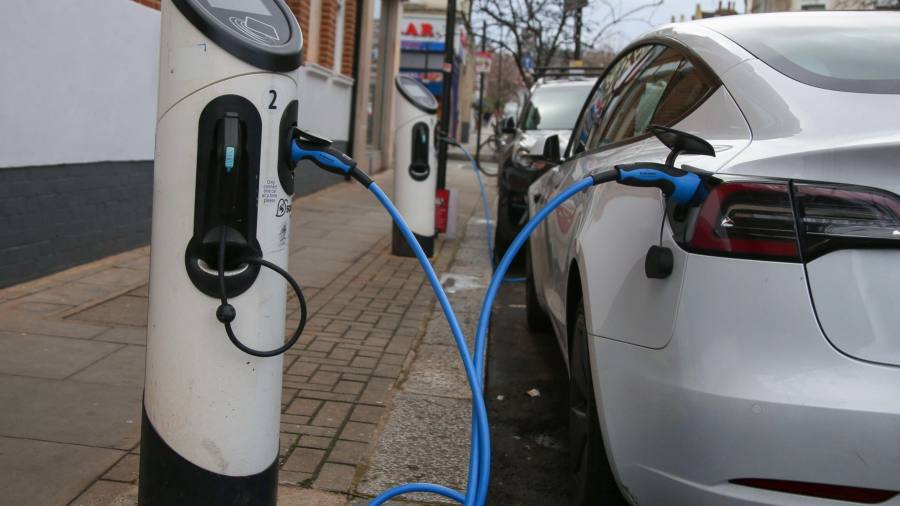[ad_1]
The sale of new electric cars overtook diesel models in the UK for the first time in 2022, but overall new car sales fell to their lowest level in three decades, according to the Society of Motor Manufacturers and Traders.
Global supply chain disruption — ranging from continued shortages of semiconductors to Covid-related shutdowns of Chinese plants — meant that carmakers were unable to meet demand, leading to the worst year for UK sales since 1992.
Some 1.61mn cars were registered in Britain last year, 2 per cent down on 2021 and even lower than the 1.63mn registered in 2020, when the industry was forced to shut down during the pandemic, according to the SMMT’s annual figures published on Thursday.
UK carmakers “never fully recovered from the pandemic effects of 2020”, Mike Hawes, SMMT chief executive, said.
“Manufacturers have really struggled to be able to make the vehicles in the quantity they need,” he added. “The complexities of global manufacturing have been brought to bear on the industry in the last year.”
Electric car sales rose by more than a quarter in 2022, accounting for 16.6 per cent of sales, while diesel demand fell to less than 10 per cent. Battery electric “is now the second most popular power-train among UK new car buyers, supplanting diesel for the very first time”, said Hawes.
Diesel once accounted for more than half of UK car sales but has fallen out of favour following the 2015 Volkswagen emissions scandal — in which the carmaker fitted software to vehicles that produced misleading results for diesel emissions tests — and with the introduction of rules in cities such as London that specifically penalise diesel vehicles.
But Hawes said diesel was still “hard to beat” for motorists who regularly travel long distances.
Petrol cars remained the most popular option for UK buyers last year, accounting for more than half of sales. Hybrid models were 11.6 per cent of the market and plug-in hybrids that can recharge were 6.3 per cent.
Electric vehicles “still account for less than 2 per cent of vehicles on the road, so there is a long way to go before we have decarbonised road transport”, Hawes added, although one in three new cars sold in December was pure electric, a figure inflated by a late delivery of Teslas from China during the month.
New rules come into effect next year stipulating that a percentage of each carmakers’ sales must consist of zero-emission vehicles. The levels are expected to begin at 22 per cent in 2024, and rise to 100 per cent by 2030.
But regulations that set out exact definitions for the targets — such as whether hybrid models count, and whether carmakers without enough electric models on sale can team up with others to hit the targets — have been delayed until at least the summer.
Hawes said the industry “first and foremost needs clarification” for manufacturers to make adjustments to comply with the rules. He also repeated calls for more charging infrastructure, which he said was still deterring some motorists from making the shift to electric.
The SMMT expects overall sales to rise by about 15 per cent this year as manufacturers are able to make more cars for customers on their waiting lists, despite the worsening wider economic outlook.
Long delays, with motorists waiting for months or even more than a year for some models, will offer the industry a “cushion” against falling overall demand, he added.
Changes to China’s Covid-19 policies are likely to mean fewer unexpected factory closures and are among the “signs that things are beginning to ease”, Hawes said. “After three difficult years we’re hoping this is a year of recovery.”
[ad_2]
Image and article originally from www.ft.com. Read the original article here.

